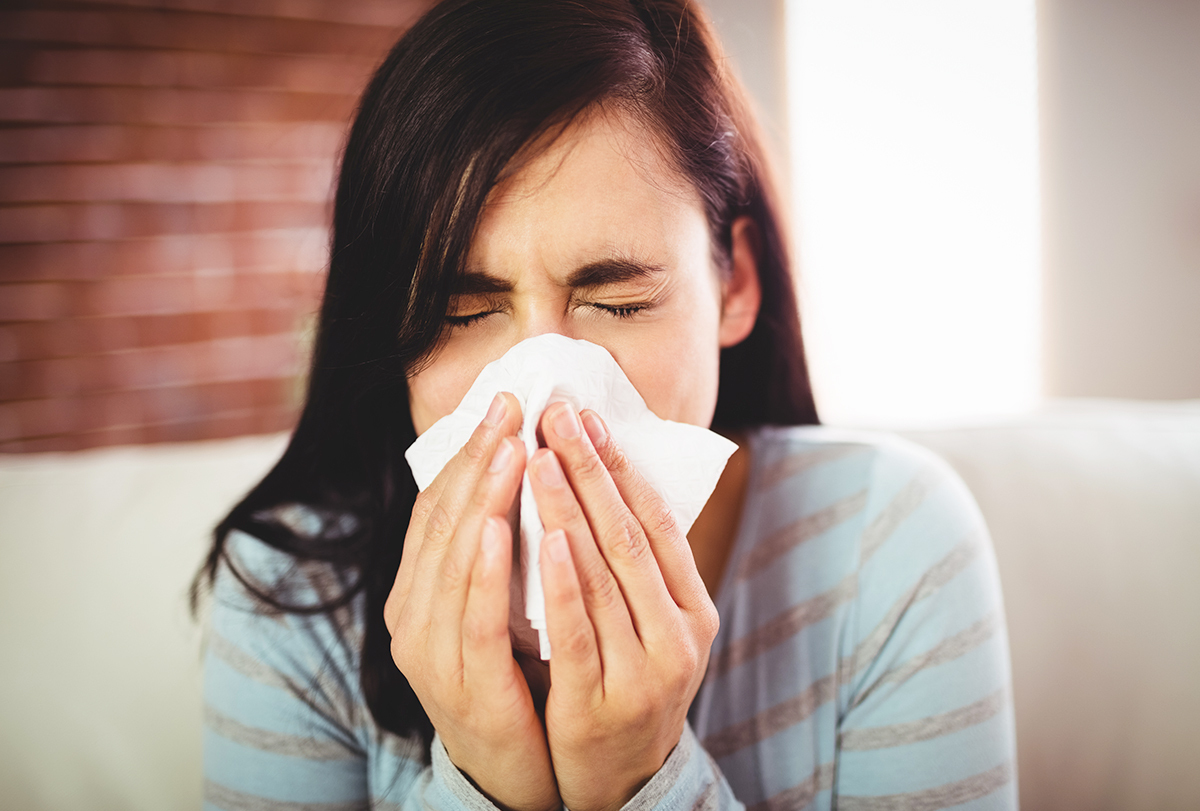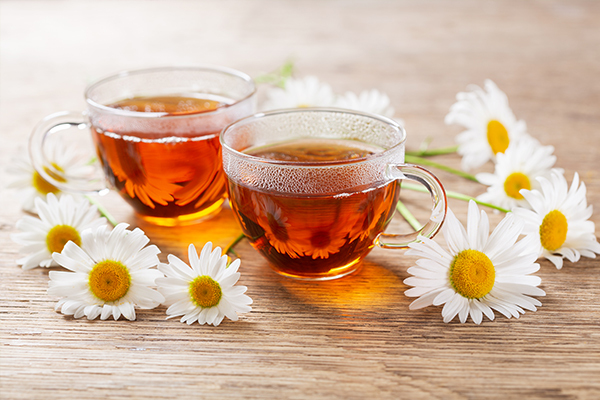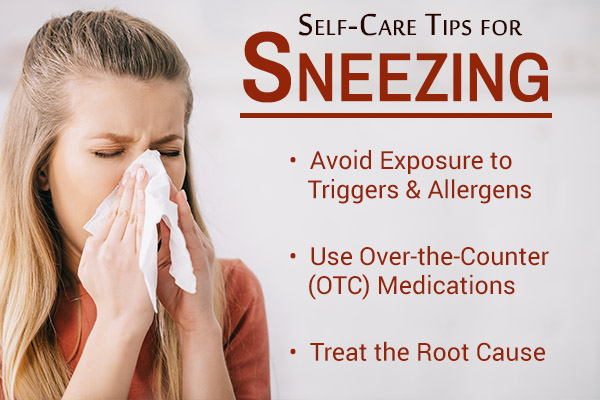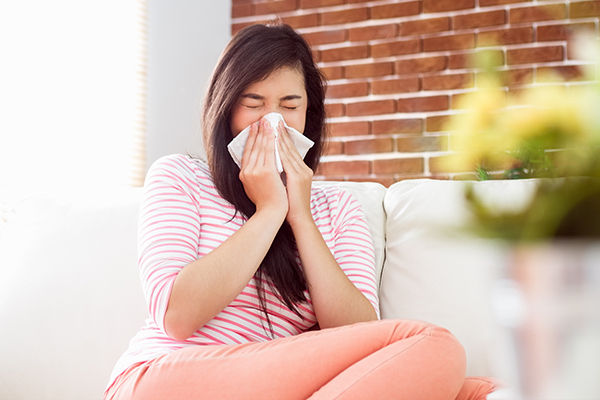In this article:
Your nose and throat are lined with extremely sensitive mucous membranes that can get easily irritated by an inhaled allergen.

The body subsequently tries to expel the foreign irritant by forcefully releasing air through the nose and mouth in the form of sneezing. You exercise no control over this natural response of the body but there are things you can do to manage it.
Home Remedies for Sneezing
Try these simple home remedies to relieve sneezing.
1. Chamomile tea

Chamomile is a medicinal herb that is credited with significant antihistamine properties, which can instantly help curb the inflammatory response that triggers a sneeze. (1)
You can consume the therapeutic goodness of chamomile in the form of tea, using tea bags, instant mixes, or dried herbs, all of which are easily available in grocery stores.
Directions:
- Boil a cup of water, add one teaspoon of loose chamomile tea or tea bag in it, and let it steep for a few minutes.
- Strain the tea into a cup, add a bit of honey to it for better taste and drink while hot.
2. Ginger
Ginger is a powerful anti-inflammatory agent that can help reduce the secretion of mucus triggered by a cold infection that ultimately clogs up the airways and leads to sneezing or coughing. (2)
Directions:
- Boil a few small pieces of ginger in water for a few minutes.
- Strain the liquid in a cup.
- Add some milk and honey or palm sugar if you like your tea slightly sweet.
- Drink it while still hot.
Alternatively:
- In a saucepan, add 1 cup of water and some ginger pieces, clove, bay leaf, and black pepper.
- Boil the ingredients for a few minutes to let the essence of the herbs infuse with the water.
- Strain the liquid in a cup and drink it while hot.
- Drink this tonic twice a day.
Self-Care Tips to Prevent Continuous Sneezing
The three central self-care measures to reduce the duration and occurrence of continuous sneezing are:

1. Avoiding exposure to triggers and allergens
- Stay away from animal dander and relocate pets if needed.
- Lower the pollen content indoors by using air filters and keeping windows closed on high-pollen days.
- Replace furnace filters regularly to prevent dust in the air.
- Kill dust mites by washing linens with hot water (54°C or 130°F).
- Use dust-mite-proof pillow and mattress covers.
- Avoid strong fragrances.
- Clean your surroundings to keep them free of mites and insects.
- Take measures to control any mold spore problem and change houses if necessary.
- Check your showerhead for mold growth, as it can trigger a sneezing bout after bathing.
- Avoid the use of other triggers such as metal and latex if they are known to be an issue.
2. Using over-the-counter (OTC) medications
You can buy antihistamines and decongestants from your pharmacy and take them in the prescribed dosage to curb sneezing.
3. Treating the root cause
In the case of viral infections such as the flu or common cold, it may be helpful to:
- Use saline nasal rinses or sprays to get relief from a runny or congested nose.
- Take antiviral medications.
- Use nasal sprays that contain a corticosteroid and/or antihistamine to reduce inflammation and prevent sneezing.
- Drink ample fluids.
- Take proper rest.
Most-Asked Questions About Sneezing

What is snatiation?
Snatiation, coined by fusing the terms “sneeze” and “satiation,” refers to a medical condition characterized by the occurrence of a sneeze or sneezing fits after having a large meal.
Also known as a stomach sneeze reflex, it is triggered when the stomach is full and stretched. The reason behind this reflex is unknown, but it may have a genetic component.
Why don’t people sneeze while sleeping?
While sleeping, the nerves are at rest due to a process known as rapid eye movement (REM) atonia. As a result, no nerve reflex is initiated even in the presence of irritants in the nose, and no sneezing impulse is generated.
Does the heart stop when you sneeze?
The heart does not stop when a person sneezes. However, increased pressure in the chest may affect your blood flow and temporarily change the rhythm of your heartbeat.
Why do people sneeze while plucking eyebrows or nasal hair?
While plucking the eyebrows or nasal hair, the nerve endings in the face get stimulated and send signals to the brain, leading to a sneezing reflex.
Can one sneeze with their eyes open?
The brain sends signals to different body parts, including the eye muscles, to prepare for a sneeze. This generates an involuntary reflex and forces the eyes to shut. Therefore, sneezing with your eyes open is a difficult task.
However, making a concerted effort to open your eyes or holding your eyelids open with your hands may enable you to sneeze with open eyes.
Is sneezing related to jaw pain?
The jaw can be affected by any problem in the head, nose, or throat. During a cold or sinus infection, you may experience pain in the temporomandibular joint (TMJ), which connects the jawbone to the skull. This pain may worsen when your mouth is forced open due to sneezing or coughing.
Can sneezing cause back pain?
Turning your head away from people while sneezing is a commonly expected courtesy.
However, twisting your neck while sneezing can affect the spinal joints. This happens because the contraction of the diaphragm while preparing for a sneeze is accompanied by the tightening of the muscles supporting your neck and spine.
The sudden violent expulsion of air can stress or strain the contracted muscles, resulting in pain. Additionally, sneezing causes pressure buildup in the abdomen, which leads to increased pressure in the spinal canal. If you have a pinched nerve or a spinal injury such as a herniated disc, sneezing can worsen the pain.
Is sneezing common during pregnancy?
Rhinitis is commonly prevalent in pregnant women (also known as pregnancy rhinitis). It can occur anytime during the gestation period and subsides after delivery.
The common symptoms of pregnancy rhinitis include sneezing, nasal congestion, and runny nose. It can affect fetal development as well as the quality of life of pregnant women. (3)
Is it normal to sneeze every morning?
Having sneezing fits every morning may be a result of allergic rhinitis. It is important to identify and avoid the allergens to manage the condition.
Can holding back a sneeze lead to hearing loss?
Though extremely rare, holding in a sneeze can result in hearing damage.
If a sneeze is stopped midway, the pressurized air in the lungs may get forced back into the ear through the Eustachian tube. This can cause damage in the middle and inner ear or can even rupture the eardrum.
Injury to the membranes of the middle and inner ear may result in conductive hearing loss, severe sensorineural hearing loss, and vertigo.
Final Word
Although sneezing is a common problem that may cause irritation if it recurs frequently, it is rarely indicative of a serious condition. It can be accompanied by a runny nose, red eyes, stuffy nose, nasal irritation, fatigue, and lack of concentration.
Simple home care and OTC medicines are likely to relieve your problem, but do visit your doctor if the sneezing becomes chronic or frequent such that it affects your daily life.

- Was this article helpful?
- YES, THANKS!NOT REALLY


